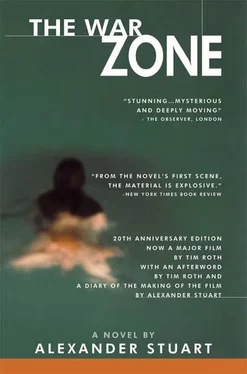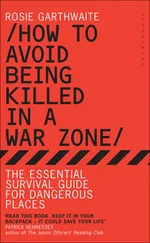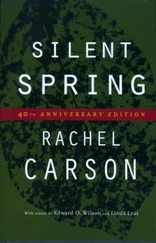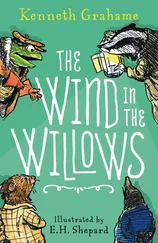Before The War Zone , I had been told by directors I had worked with I should direct, but I didn’t want to give up acting to do it. It did intrigue me – the machinations of film-making, the fact that you have to have eighteen-hour conversations about wallpaper, about every single detail of the film; to do it just fascinated me, the chance to get involved with all the elements of film-making that had passed me by as an actor. But then there was the insecurity of an actor as well – if I gave up my job for two years to make this film, would they want me back?
What surprised me about the process of making the film was everything. The screenplay, the crew, the actors, the family we invented. Everyone put such warmth and effort into the production. It was like no set I had been on before. I saw the trailer the other day – and that surprised me, too. They got it right first time, the team who made it. I sat down and started watching it and I had to stop and see it again – it made me cry.
On the day we started filming, I had a general fear of shooting for the first time, but once I’d got the first take under my belt and talked to my actors, it was down to business, to making it work, trying to get the cast up to the emotional standard I wanted. Directing has to be about communication, that was what Alan Clarke had – an absolute ability to communicate with the cast and crew. You either know or you don’t know about directing, and that’s what you have to find out.
I think I knew I had a sense of composition, of filmmaking, and I surrounded myself with the best technical people, so I knew that would work, but to me the one thing that scared me was the actors, because I’d been badly directed myself in the past and I knew what that felt like – it’s a scary thing to be out there as an actor in the first place, and I was asking them to do things that I didn’t know I could do myself. And they did extraordinary stuff.
What has impressed me most about the whole project is the commitment of the crew and the actors who came to it with a passion, with a deep concern for the subject, and even when it was emotionally very difficult for them, they weren’t afraid to push themselves beyond what felt safe. I think they loved this family and were heartbroken at its destruction. This is an important and universal subject – children are everywhere, victims are everywhere, parents are everywhere, but so are abusers.
Tim Roth May 1999
The War Zone Diary
by Alexander Stuart
Life before Tim
For a book as undeniably dark and difficult as The War Zone is, the response it has provoked has been a remarkably positive force in my life.
Even the publication-year furor in 1989, when I was told my novel had won the Whitbread Best Novel Prize (now the Costa Book Award), only to have it snatched away because juror Jane Gardam so objected to my ‘repellent’ book that she complained to Whitbread itself that it would reflect poorly on them as a “family company” (a brewery, no less) if The War Zone were to win, was probably more prestigious – and certainly more interesting – than winning the prize itself.
Although originally commissioned on the strength of a fifteenpage outline for Christopher Sinclair-Stevenson at Hamish Hamilton in the UK, I had no idea when I finished The War Zone whether it would find an audience at all. My young son, Joe Buffalo, was sick with cancer for most of the writing of the novel, and only the fact that I felt driven to complete it, when I had no interest in anything other than spending time with him, gave me a sense that the book might have some worth.
The novel was published simultaneously in Britain and the United States, where, surprisingly, given my liberal use of English slang, it was better received than at home – until the Whitbread controversy prompted British newspapers that had previously ignored the book to break their silence.
Within months of publication, a friend introduced me to film producer Barbara Broccoli – daughter of the legendary James Bond producer, Cubby – who wanted to develop a film of the novel. I liked and trusted Barbara enormously – I made it a condition of our deal that she go down the helter-skelter with me on the pier in Brighton, where I lived at the time, and she did.
She commissioned me to adapt my novel as a screenplay. I wrote two drafts, but it was the same year that my son died, and aside from any problems the subject matter itself may have created in terms of developing a film, my heart wasn’t in it and I was difficult to deal with – I remember arriving at one meeting so angry, it took an hour and a half to calm me down.
When Barbara’s option in the novel expired, another producer, Eric Abraham, approached me. As much a fan of writers as directors – a rare find in the film industry – Eric had a real enthusiasm for the book and also wanted me to adapt it myself. (It’s fairly unusual for authors to adapt their own material, often for good reason.) He was happy to involve director Nicolas Roeg, a friend I greatly admired as a filmmaker, and with whom I had made Insignificance a few years before.
Despite a reputation in the industry for being somewhat abrasive, Eric was enormously supportive over the next couple of years, as I wrote various drafts of the script and we attempted to find finance for what we knew would be a difficult film. Eric stayed on board when I separated from my long-term partner, Ann Totterdell (Joe’s mother), and moved from Brighton to Miami Beach, to rebuild my life after my son’s death.
Eric remained unfazed when – as part of a deal to involve a new director, Danny Boyle, who had just made Shallow Grave (and is now world-renowned for the multi-Oscar winning Slumdog Millionaire) – another producer, Sarah Radclyffe, who was also a long-time friend of mine, became a part of the equation.
At the time of Danny’s involvement, after a period in which I had begun to wonder whether the film would ever get made, I felt a new excitement for the project. I was in Australia at the time, with my girlfriend (now my wife and the mother of our children), Charong Chow, who was studying abroad, and we both flew to London to stay at Sarah’s house and meet with Danny.
Danny was a blast of fresh energy, with a commitment of his own to the subject matter of the book. As artistic director of the Royal Court Theatre in London in 1990, he had called me once at home out of the blue and asked me to adapt The War Zone for the stage, but the stage rights were tied up with the film rights and I couldn’t do it.
Danny and I worked on various drafts of the screenplay during 1994 and early 1995, trying to crack some of the challenges the novel presented. Much of the power of the book came from the fact that Jessie is seen through Tom’s eyes – her strength and deeply-buried pain were harder to establish objectively in the script, as a role for a young actress. We had long discussions about how much Tom should know, and when.
One of our major changes – decided during a bus trip in Cuba, where Danny was showing Shallow Grave at the 1994 Havana Film Festival – was to end the film in Devon and resolve everything at the cottage, rather than jumping to the change of time and place (ironically, a Caribbean island) that I had used at the end of the novel.
Sadly, although Channel Four Films loved Danny ( Shallow Grave had been a big success for them), and had been interested in The War Zone for some time, we could not get the project to a stage where they would commit to financing it.
Finally, Danny had to choose between The War Zone and another film he had been developing, Trainspotting . I was devastated when he told us his decision, but it would be hard to argue that he made a mistake.
Читать дальше












